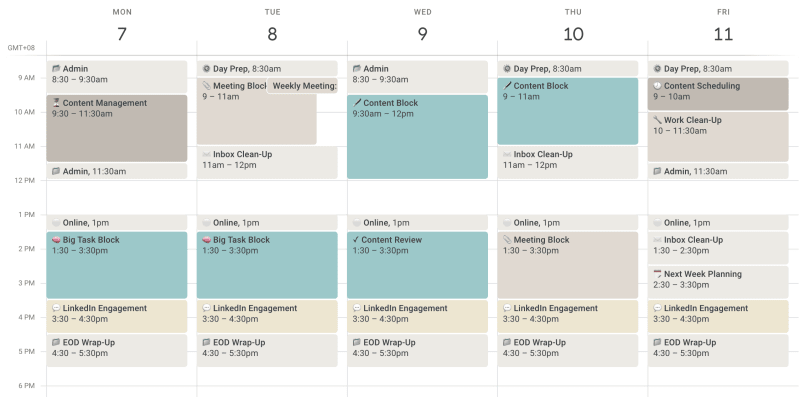4 Things You Can Start Doing Now to Protect Your Time
We've all heard it:
Time is your most valuable resource.
Or maybe you're more familiar with, "Time is gold." (If we really have to compare, time is worth more than gold.)
It's finite. It's yours first, then yours to spend. Lose one hour, and you never get it back. Yet, surprisingly, time is something we freely give away without much thought (most of the time, for most people).
Stop wasting, start protecting.
24 hours a day isn't much when you consider 8 hours of work, 6-8 hours of sleep, and 2-4 hours for meals.
Have you ever paused for a moment and thought about how your day went? Where did you spend your time? What value did those hours give you? Was it worth it?
Stop wasting your time. Keep it locked, given to carefully-selected investments—your health, your happiness, your freedom.
Below are four things you can start doing right away to protect your time.
Say no.
Saying yes to one thing means saying no to countless others—reading, exercise, journaling, alone time, Netflix, and so on.
So when you say yes to dinner with friends, and it ends with drinks until two in the morning, think about how many other things you said no to. Quiet time at home, sleep, health, early morning plans, habits.
When someone or something needs your time, evaluate first. Sometimes it's worth it, like family time on Sundays or wine night with friends you haven't seen for months. (It's okay to have late nights, as long as you're at peace with everything else you're declining.)
And sometimes, it's not worth it.
Time Blocking
Cal Newport's time blocking method helps you plan your day while protecting your time. You plot your tasks on your calendar by dedicating chunks of time (depending on how much time you need to finish the task).
For example, you can have two hours of writing in the morning (from 8 to 10), then an hour of meetings (from 10 to 11), then an hour for emails and other messages (from 11 to 12), then lunch, and so on.
Here's how my week is set up:

Sometimes I rearrange the blocks, sometimes I change them entirely, depending on my tasks for the week.
I don't add all tasks to my calendar because it takes up too much of my time to do that (I mostly refer to my to-do list, which I keep open right beside my calendar). These blocks help me keep track of my time and make sure that I finish tasks within their dedicated slots.
How time blocking helps me protect my time:
- It makes sure that all my work hours are accounted for. Following my schedule keeps me focused, away from social media and other distractions.
- I try to avoid opening apps because it's easy to be sucked in for hours. So, I have my notifications turned off. Instead of always being online and available, I have dedicated blocks for checking my inbox (emails and other messages).
- Aside from protecting my time in general, I also want to be able to work deeply, especially when the task requires huge mental energy. The teal boxes in my calendar are reserved especially for that kind of work. By scheduling those blocks in advance, I'm able to protect them and not schedule anything else.
As for my personal time, I also have blocks for my morning routine, for reading, and now, for writing. Saturdays are reserved for family and friends, and Sundays are for rest.
Keep Meetings Short
Work meetings are draining, and they waste many, many hours. It consumes your time, multiplied by the number of attendees. That's a lot of expenses for the company, and a huge cost to you too.
Keep it as short as possible, while going over all important points. To do that, here are three key things you can do:
- Send the agenda along with the meeting invite and ask everyone to prepare and bring any necessary files.
- Set an end time. Many people set the meeting date and time, but not how long the meeting will take. Set the duration and end the meeting on time.
- Stick to the agenda. If there are other things you need to talk about, set another meeting. Discussing additional topics will lengthen the meeting.
Also, before you accept an invitation, make sure you're needed in the meeting. If not, decline.
Silence Notifications
My phone's on Do Not Disturb most of the time. Most calls won't get through, but select contacts can call me anytime. I will see the missed calls and any messages that came through when I do open the apps, but I don't get notifications the moment I receive them.
This is why I rarely respond to messages right away. In fact, when you message me on social media, I might not respond until 24 or 48 hours later.
Instead of instant replies, I have time blocks dedicated for checking messages. This helps me stay focused on my work.
Even emails. They seem important, and responding to them right away might feel productive, but they're also a distraction. Create that email block.
How we spend our time tells us what's important to us.
So, how much is your time worth? How much is an hour? Is scrolling through social media worth it? Is the 4-hour networking event that important?
I don't mean we should be working 12 hours a day. Just be mindful and ask yourself, "What's the best way to invest my time?"
Invest in your wellbeing—whether that means more time with family and friends, more time working for financial freedom, more time doing volunteer work, or more time with yourself.